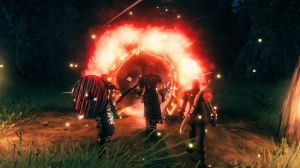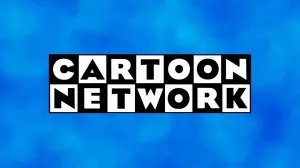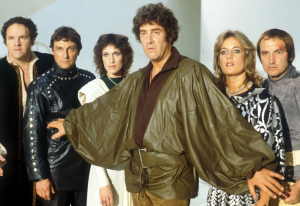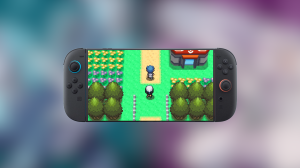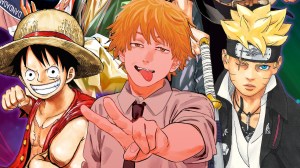In the ’80s and ’90s, Disney games were all the rage, but they offered a stiff challenge that made them a chore for younger audiences to overcome. Decades later, Dlala Studios has attempted to recapture the magic of those classic games with Disney Illusion Island on Nintendo Switch. The platforming game doesn’t skimp on the challenge level, but the developer has introduced a number of options that make it a lot fairer than retro Disney games. The result is an adventure that should hold a lot of appeal for platforming fans of all ages.
Videos by ComicBook.com
In Disney Illusion Island, Mickey, Minnie, Donald, and Goofy find themselves mysteriously invited to the land of Monoth. While they assumed they were there for a picnic, the whole thing turns out to be a ruse by the Hokuns and their leader Toku. Toku tells our heroes that three Tomes of Knowledge have been stolen by thieves, and if they aren’t returned, a great calamity will take place. Mickey, Minnie, and Goofy quickly agree to help (Donald is a little more reluctant), and the adventure begins, with all four serving as playable characters.
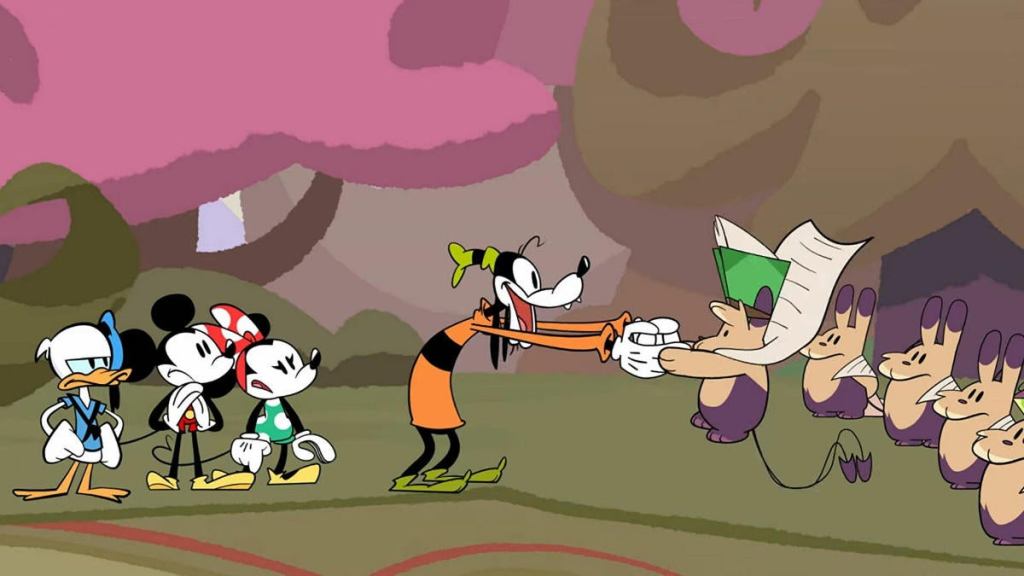
When Disney Illusion Island begins, the first thing players will notice is that the difficulty level is not determined by selecting “Easy,” “Normal,” or “Hard” settings. Instead, players choose how many hearts they want to start with; there are options ranging from one to three hearts, as well as a metal heart that makes the player receive no damage. Players can also change that number anytime they load their save file, making the experience harder or easier depending on preference. On the surface, focusing on hearts versus difficulty might not seem all that significant, but it’s a very smart decision, as it allowed Dlala to make one platforming experience that can appeal to all skill levels. In multiplayer, this also means that older players can still enjoy a challenge while younger players take it easy.
None of this would matter if Disney Illusion Island were an easy game. The fact of the matter is that Dlala Studios did not shy away from offering a challenge. Even the most skilled players will likely die often as they miss jumps or fail to avoid an enemy’s attack. In an interesting move, Disney Illusion Island offers no combat, which means Mickey and friends will have to focus entirely on their jumping prowess to avoid foes, and that’s easier said than done. There’s a wide variety of enemies to overcome, and they each have their own attack patterns. Thankfully, the game features plentiful save points, and players will quickly respawn after dying. In fact, the save system is incredibly fair, as save points will automatically activate if the player is in close range.
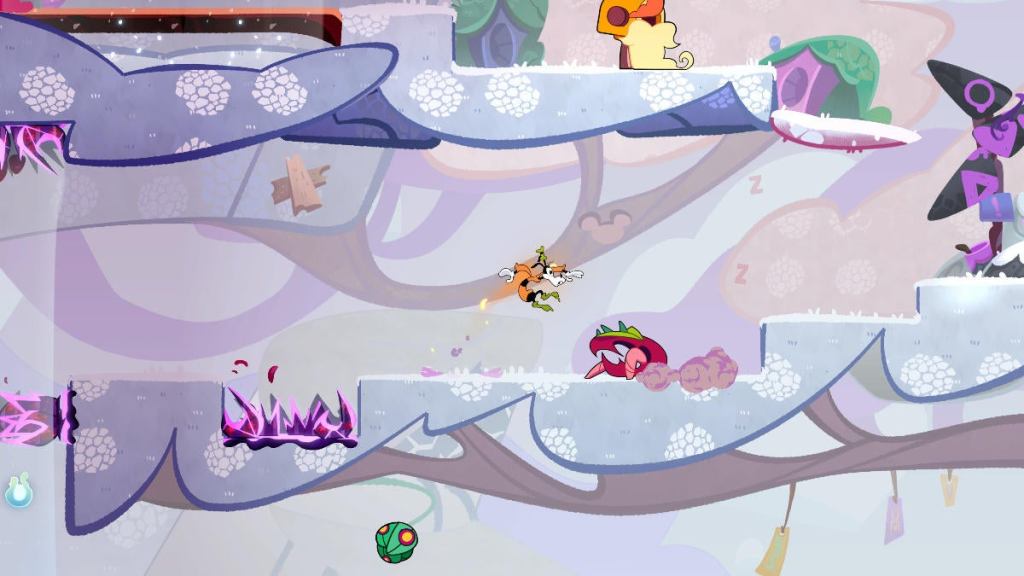
In addition to being a platformer, Disney Illusion Island is also a Metroidvania. The three biomes that make up Monoth are all interconnected, and players will gain access to more areas as they unlock new abilities. The character Mazzy will teach the Fab Four how to perform things like Wall Jumps and Ground Pounds that will help open up the map as the game goes on. Boss battles task players with stringing these moves together to avoid obstacles and cause items to fall on their opponent’s head. As with most Metroidvania games, there is a bit of backtracking that players will have to do, but the game does a pretty good job steering players in the right direction. I never once found myself lost or unsure where I needed to head next.
Disney Illusion Island‘s art style draws inspiration from the Mickey Mouse shorts of Paul Rudish. The character designs themselves should be immediately familiar to anyone that has watched the cartoons, or those that have been on Mickey & Minnie’s Runaway Railway at Disney’s Hollywood Studios. Disney Illusion Island does an incredible job replicating that style, while also offering an entirely new world and characters that blend well with the style. Even more impressive, the game’s animation team has managed to make each member of the Fab Four look and move differently, despite playing the same.

The game’s animated authenticity extends to the sound department, as well. Disney Illusion Island features the official voice actors for the Fab Four, and their chemistry elevates the overall game. The dialogue between the characters is fantastic, and there are a number of excellent gags throughout. Disney Illusion Island also features a brand-new, fully orchestrated soundtrack.
Unfortunately, the experience is over fairly quickly; I was able to finish Disney Illusion Island‘s story in under seven hours. The game offers a lot of extras for players to seek out, including Hidden Mickeys, Mickey Memorabilia, Tokuns (which act as biographies for the game’s cast), and Glimts (shiny objects that unlock concept art and background info about Monoth). The Mickey Memorabilia in particular is nice, as it spans the character’s entire history, calling back to some of the character’s oldest adventures. All these extras are great, but they don’t do much to bring up the game’s length, as I finished with a 72% completion rate.
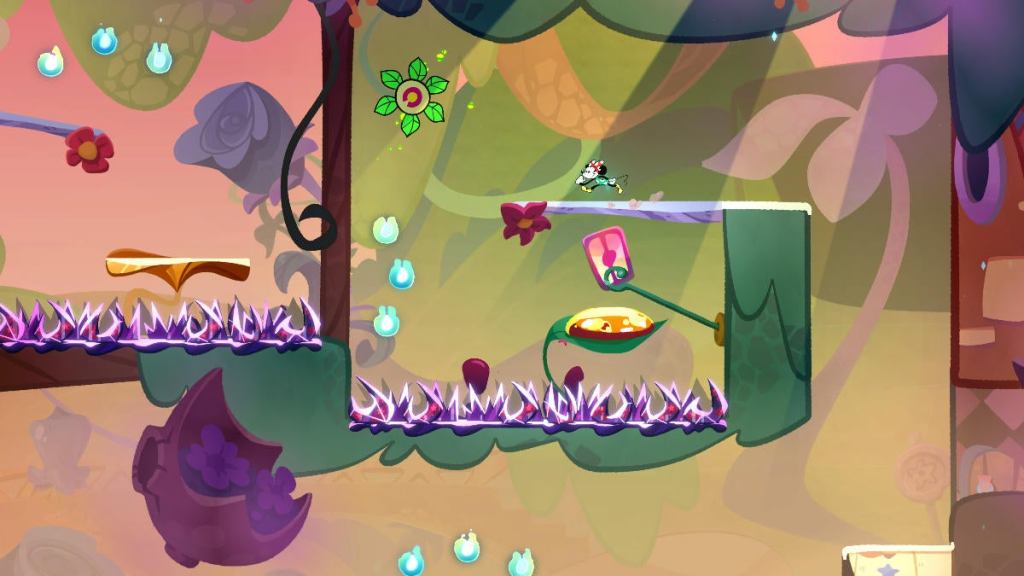
The length isn’t the only negative. While the camera does a much better job than most 2D platformers, there are times when things are panned out so far that it makes it easy to assume things are part of the background. At one point in the game, I got a notification that I had grabbed a Tokun without even realizing I had found one, as it had blended in with the background. At another point, Mickey ended up getting eaten by one of the living platforms I’d landed on because I couldn’t tell it wasn’t an inanimate one. While not truly a negative, the game’s heart system also gets messed up a little bit when players are granted extra hearts throughout gameplay. For example, I played on the two heart difficulty setting, but the game gifted me two more as I progressed throughout. As a result, if I selected “two hearts” when loading back into my save file, I’d automatically have three, and then later four. Basically, this means that any player that wants to stick with one or two hearts can’t really do that.
One of the biggest problems with platformers is that they often struggle to find the balance between tough and fair, and this was especially true in the ’80s and ’90s. Disney Illusion Island finds that balance in a way that feels almost unheard of. The game never speaks down to the audience, offering enough tools that can make the game easier or harder, and players are never punished with distant save points that make the game a chore. Disney Illusion Island is a love letter to Mickey Mouse, offering a beautifully animated experience with great humor and a challenge level that’s welcoming to experienced players and newcomers alike. The game’s short length is easily its biggest negative, but Dlala Studios has given platforming fans a wonderful time while it lasts.
Rating: 4 out of 5
Disney Illusion Island is set to release July 28th exclusively onNintendo Switch. A code was provided by the publisher for the purpose of thisreview, and it was reviewed on a Nintendo Switch OLED.



